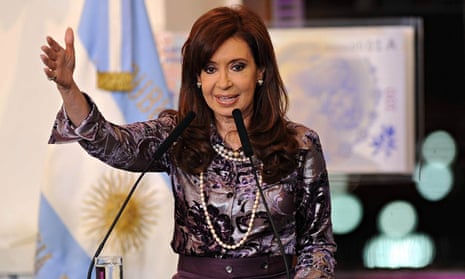An Argentinian federal prosecutor has accused the country’s president, Cristina Fernández de Kirchner, of attempting to cover up Iran’s involvement in the bombing of a Jewish community centre in 1994, in which 85 people were killed.
Prosecutor Alberto Nisman said on Wednesday that he had issued a request that judge Ariel Lijo interrogate Fernández and the foreign minister, Héctor Timerman, “for being authors and accomplices of an aggravated cover-up and obstruction of justice regarding the Iranians accused of the Amia terrorist attack”.
In a 300-page presentation to a Buenos Aires court, Nisman alleged that the president conducted secret negotiations with Iran through non-diplomatic channels in 2013, and offered to cover up the involvement of Iranian officials in return for oil to ease Argentina’s chronic energy deficit. Under the deal, the oil would be exchanged for Argentinian grain, Nisma said.
The attack on the Argentinian Jewish Mutual Association centre was the country’s worst ever terror attack, and remains unresolved. Nisman’s investigation into the Amia bombing reached a dead end some years ago after Iran refused to hand over a number of officials, including the former Iranian cultural attaché in Argentina, Mohsen Rabbani, who is suspected of masterminding the deadly 1994 attack.
The Jewish community in Argentina expressed concern at the accusation. “We are very worried,” said Amia’s president, Leonardo Jmelnitzky. “We really did not expect something like this.”
Nisman said his accusations were based on phone taps on close allies of Fernández, who he said conspired in a “sophisticated criminal plan” to negotiate with Rabbani himself. In exchange for the “oil for grains” deal, Argentina would cancel an international Interpol arrest warrant against Rabbani and other senior Iranian officials.
“Iran was Argentina’s main buyer and now it’s buying almost nothing,” the prosecutor quotes Rabbani as saying in an intercepted 2013 telephone conversation with an Iranian link who had contact with Fernández allies in Buenos Aires.
“That could change. Here [in Iran] there are some sectors of the government who’ve told me they are willing to sell oil to Argentina … and also to buy weapons.”
In 2013, Argentina signed a controversial agreement with Iran to set up a joint commission to investigate the blast. Nisman claims that deal was a direct result of the “oil for grains” secret deal that he alleges Fernández sought.
In that memorandum, Iran agreed to set up a truth commission on the bombing in return for Argentina closing down the judicial investigation and cancelling the Interpol warrants while the commission worked.
The agreement, which was roundly condemned by Jewish community leaders, was approved by Argentina’s Congress but foundered after Iran failed to confirm it, apparently because the Interpol warrants were not lifted in time. It was finally declared unconstitutional by the federal appeals court.
Nisman claims that his accusation is based on “irrefutable proof” against the president, contained in a 300-page report presented in court on Wednesday morning, and that it is based on two years of investigations and wiretaps conducted by sources within Argentina’s Side secret service.
The accusation was dismissed as “ridiculous” by the presidential secretary, Aníbal Fernández.
The attack against the Amia followed the earlier bombing of the Israeliembassy in Buenos Aires in 1992, in which 29 people, including four Israeli civilians, were killed – a case which also remains unresolved.

Comments (…)
Sign in or create your Guardian account to join the discussion